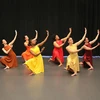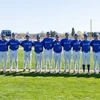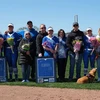 Many college students choose to flee their still-chilly campuses in March and flock to Florida’s beaches and other warmer regions for a well-deserved respite from academia. It’s called Spring Break.
Many college students choose to flee their still-chilly campuses in March and flock to Florida’s beaches and other warmer regions for a well-deserved respite from academia. It’s called Spring Break.
This year, a small contingent of Fredonia students went south at the tail end of an especially brutal winter, but they eyed a different destination and were motivated by a far greater goal.
Twenty-one students, led by Social Work Professor Rolanda Ward and two student program managers, served as volunteers during the third week of March with the East Cooper Habitat for Humanity near Charleston, S.C., in Fredonia’s first annual Alternative Break Program (ABP). Their mission was to heighten social awareness, enhance and encourage personal growth, and advocate for lifelong social action in a unique educational experience outside of the classroom.
Teams of students toiled on a variety projects. They tore off an old roof and installed new shingles, mounted shutters, wielded paint brushes and made landscaping improvements that included planting shrubs and flowers. They also performed numerous merchandising tasks — cleaning, stocking displays, sorting donations and loading items into customers’ vehicles — in the Habitat for Humanity retail outlet.
Lodging was provided at the Isle of Palms Baptist Church. Students, who also had the use of a kitchen there, were responsible for all grocery shopping and meal preparation. Everyone took turns cooking, cleaning and doing dishes.
Students were also responsible for funding program costs, such as housing, food and mileage. To their credit, the program recorded an unexpected surplus of nearly $180 after all expenses were tallied.
Jeannie Galbraith, one of the student program managers, believes the experience gave students a sense of fulfillment.
“They have an opportunity to be part of something that is greater than themselves,” she explained. “When we had reflections at the end of each day, students all agreed that they felt they had accomplished something and that it was a life-altering and humbling experience to be a part of.”
Group discussions led each evening by Galbraith and fellow program manager Daniel Galusha were a forum for students to recount activities of their day and discuss a myriad of social topics — such as poverty, homelessness, discrimination, education, family units, community-based resources and political involvement — and explore how they are connected to activities of each day.
Through this eye-opening experience, Galbraith, now a senior majoring in Social Work and Psychology, believes students gained valuable knowledge about Habitat for Humanity and populations the agency serves. “Students will take away strong friendships, a new-found sense of service, and what it really means to serve,” she added.
Social Work was the most common major among the students, although many other majors participated and plan to work in the human service sector.
Gailbraith suggests that being exposed to different social service agencies, cultures and diverse populations may influence career goals or pursuit of an advanced degree among some students, who also learned about AmeriCorps through two of the agency’s representatives they met during their Habitat for Humanity experience.
Dr. Ward, who had participated in numerous ABP trips prior to joining Fredonia, would like the ABP to be expanded at Fredonia so it can reach programs in all departments and provide a safe alternative college experience as well as service learning opportunity for students. She is especially proud of Gailbraith and Galusha, who were critical components of the inaugural program’s success.
“Students, with mentoring, are capable of great feats,” Ward beamed.
Participants in Fredonia’s ABP seek to learn about and comprehend the underlying causes of social problems, and in doing so seek social change and social equality, according to the mission statement.
If you would like to support future ABP endeavors, please donate to their fund, established through the Fredonia College Foundation.



